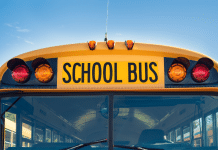 Dear Parents: My years in the classroom influence my parenting. While I don’t have all the answers, I’ve spent over a decade as a parent and a high school teacher. As we embark on the start of another school year, I want to share three ways my years in the classroom influence my parenting.
Dear Parents: My years in the classroom influence my parenting. While I don’t have all the answers, I’ve spent over a decade as a parent and a high school teacher. As we embark on the start of another school year, I want to share three ways my years in the classroom influence my parenting.
- My years in the classroom taught me that perfection is not the goal. Education is a process and is an important tool for learning not only content but life skills. So often in my years as an educator, my students (and their parents!) would be obsessed with perfection. They weren’t satisfied unless an assigned grade was perfect. Many children come by this honestly. How many of us strive for perfection in multiple areas of our lives and then become overwhelmed when perfection is not met? (Guilty!) Part of the school process is to help our children become successful with skills such as time management, goal setting, prioritization, and self-awareness of strengths and weaknesses. If we are hyper-focused on perfectionism, our children then become conditioned to believe that perfection is the only thing that matters. Over the last number of years, this pursuit of perfection has been linked to increased anxiety and depression and decreased self-confidence. While this is so hard (old habits die hard!), my years in the classroom have influenced my parenting with how I respond to my children’s work and grades. While the grades do matter, I ensure that I always ask questions that reinforce the process of learning. (Were they proud of their work? Did they manage their time well? Did they ask questions if they didn’t understand? Were they a good team member if it was a group project?) If we don’t want our children to be hyper-focused on perfectionism, we must respond to their work and grades in a matter that reflects that.
- Remember your child’s teacher is meant to be an advocate and teammate. Both of you want the same for your child- a successful school year. My years in the classroom as an educator taught me the importance of timely, factual, and respectful communication between teachers, parents, and students. If you have questions about an assignment, classroom activity, or your child’s progress (or lack thereof), don’t hesitate to reach out to your child’s teacher. So often, questions and confusion can be clarified or answered with open communication. Furthermore, when appropriate, I always look for opportunities for my own children to take ownership of communication. For example, if something happened at school that bothered my child, we may talk about it at home, and then I may help them draft a message to their teacher or email the teacher to let them know they should expect my student to address a question or concern with them. My years in the classroom taught me the importance of using this student-teacher relationship to help a child learn to self-advocate. After all, when your child gets their first job, plays on a team, or goes to college, they will need to know how to effectively self-advocate. As this article from Forbes shows, our children must have opportunities to learn to stand on their own. *Note: I do realize there are some instances where a teacher/parent/student relationship or issue can not easily and succinctly be satisfactorily resolved.
- So much of our personal identity is comprised of our role as parents that it is easy to feel as though our child’s achievements reflect our success as a parent. This is categorically untrue. Our worth as a parent is not defined by our child’s success. My years in the classroom solidified to me our worth as a parent is reflected in our role in supporting, nurturing, and helping our children discover who they are meant to be. There is a lot of competition in the parenting world, and during the school year, it is all too easy to get caught up in wanting to make sure our child is keeping up with their peers regarding school, sports, honors, and so much more. It is easy to get caught up in believing accolades and success is a reflection of great parents. While good parenting and children’s success can definitely be correlated, it is not the best measure. Good parenting is acknowledging where your child is and helping them grow, develop, and succeed where they are.
As we embark on the beginning of another school year, always keep in mind the big picture: we want to raise a happy, healthy, and well-rounded human. In the classes I taught (both college-level and regular for seniors), I couldn’t tell you who knew their ABCs first or who was selected for advanced math in second grade. While there were still differences in academic achievement, the greatest predictor of my students’ future success was having a solid work ethic, confidence in who they were, well-rounded interpersonal and academic skills, and an internal drive for success. Cheers to you, parents, as we embark on another school year, and I hope you and your child have a successful school year (whatever that looks like for you!).










This was excellent, Alicia! My favorite line: the greatest predictor of my students’ future success was having a solid work ethic, confidence in who they were, well-rounded interpersonal and academic skills, and an internal drive for success.
I can tell you are a thoughtful, caring, and knowledgeable teacher and parent.
Comments are closed.